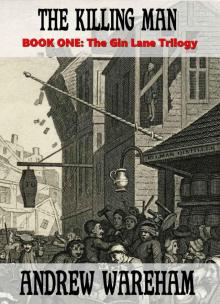- Home
- Andrew Wareham
A Killing Too Far Page 2
A Killing Too Far Read online
Page 2
“A heavy leather bag with a sort of padlock to it. Money, I should reckon. I left it where it was.”
Jacky was a hard man, not a thief. The distinction was important to him.
“Bring it out, please. I shall take a look at the barn the while. If there is anything else of use to us, put it up in the cart, Jacky. Then set light to the place.”
Happy Henry stirred into life and speech.
“Do it.”
Happy Henry liked fires.
Sam nodded.
“Jacky will help you.”
The barn had little to offer – two old stills, part of one repaired with iron rather than copper and showing rusty in places. Smith had used wooden kegs to store the spirit he ran off, and they were ancient, poorly cleaned and smelly. There was a trace of wild yeast on the walls in a dark back corner. He had used a potato mash, had perhaps half a ton of tubers in a dirty bin, sat wet and starting to stink. A quick search showed nothing that Sam wanted. There was a single stall at the back, a young riding mare stabled. Sam opened the half door and shooed the horse out into the paddock behind the barn. He opened the gate into the field; she would stray and be found within the day by a neighbour who would soon hear that Smith was gone and would tuck her away with his own stock, nothing said.
“I put the bag up in the cart, Mr Sam. Nothing else at all worth bothering with.”
“Well done, Jacky. Lend me a hand with Smith now. He can go into the house and burn with it. We can leave the barn for the constable to discover and make up his own story. With Smith’s body burned, there won’t be any call to make a fuss.”
Happy Henry enjoyed himself starting a fire in the kitchen of the farmhouse; they brought in logs from the firewood stack and put them by the chimney breast, as if Smith had been too idle to go outdoors of an evening and had kept them carelessly to hand. Cooking fat from the pantry and a tipped over pan would offer a story, if the constable was interested.
“Frying up over the open fire, Jacky. Fell asleep drunk and never woke again when the fat flared and the house went up around him.”
“So it did, sir. Come away now, Henry. We can watch from outdoors.”
Flames reached up to the wooden ceiling within minutes and the bedroom floor fell in, the old walls acting as a chimney.
“No saving that one, Jacky, or discovering anything inside. Time we left.”
Slowly back to the White Horse, Jacky taking his brother home and settling him down after his exciting afternoon before returning to the inn.
“He’ll sleep till morning, Mr Sam, then wake up hungry as a horse.”
“Poor fellow. Do you ever have any trouble with him, Jacky?”
“No, sir. He’s a good lad for doing as he is told. My only is fear is that I will die one day, and then where will he be?”
“God knows, Jacky. I will look after him, or have him looked after, more like, not having time to do it myself. There will be someone kind to be found, and well paid. I will promise you that.”
“You are a good man, Mr Sam.”
“There are few would say that, Jacky. Now then, bonus for today’s job at the normal rate for special work. Three guineas apiece, cash in hand.”
Jacky took the six coins with a word of thanks and went back to the cottage, to watch over his brother.
Sam wondered what Jacky did with his money – he seemed never to leave the cottage to spend it. He shook his head and turned to the leather bag and its simple smith-made lock. He took it out to the stables, perched it on the farrier’s anvil and used a hammer and cold chisel to open the chain.
“Mostly coppers! A few silver shillings, but not many.”
He lugged the bag indoors and upended it on a table in the back place, behind the bar, made a long, slow count, separating out the various coins.
Abe came in and raised an eyebrow.
“Smith’s savings, it would seem, Uncle Abe. It seems likely that he had a backer of some sort who took the bulk of his money. He must have been raking in a good ten pounds a week, but there’s less than fifteen here in total.”
“Creaming, Sam. As the money came in our Mr Smith would pinch a few coins from each payment. He was no more than a paid hand, I would wager, Sam, renting his barn and his labour to some figure in the background. I wonder whether he was a yeoman farmer or a tenant obeying his landlord – that would make a difference. It will come out eventually. Nothing to be proved, but the only person to gain from getting rid of Smith is you. There will be questions asked, unofficially – the authorities will know nothing and do less. I shall soon be told who is doing the asking. A week or two and we will know what we must do next. I suppose it was necessary to kill him?”
“Not a lot of choice, Uncle Abe. He wouldn’t be sensible at all.”
Abe shrugged; the boy killed too easily for his liking, but while his targets were no more than low criminals, there was little loss in his actions. Perhaps getting married, having a wife at his side, might calm him down. No more than five days before the ceremony – a pity it could not have been sooner.
“Mr Sam! There’s a man by the name of Malone asking to speak to you.”
“Ah, good! I had expected him within a day or two, Timothy.”
Sam stood from his desk and the accounts book he was laboriously filling in, glad of the excuse to put his pen down. He walked out to the front of the distillery, saw the landlord of the First In Last Out waiting, literally with his hat in his hand.
“Mr Malone, good morning to you, sir. I must imagine that you wish to become a customer?”
“I do indeed, Mr Sam, if you will permit.”
“Why should I not? Do you need to take some bottles with you today or will you wait on the normal delivery at the end of the week?”
“Now would be convenient, if possible, Mr Sam. I am low at both of my houses.”
“Easily arranged, Mr Malone.”
Sam waved across to Timothy, informed him that Mr Malone was now a customer for their gin, that he was to be charged exactly the same price as every other purchaser.
“I much hope you will find ours a smoother product, Mr Malone. You can see that the stills are all clean – bright, shiny copper and everything washed down daily. No whitestick here, sir!”
Malone was properly impressed.
“I could wish you produced a brandy as well, Mr Sam. There are one or two of my customers would appreciate that rather than gin, but it is hellish hard to come by in this neck of the woods.”
“We are a distance from the East Coast, Mr Malone. An amount of brandy trickles across, I am told, but I know not who handles it locally. I shall speak to acquaintances and discover whether they know of suppliers. It will take some considerable time, I do not doubt, but I shall make a try.”
Before Malone drove off in his pony and trap, with a crate containing two dozen quart bottles tucked away where it would not rattle and bounce. He had confided to Sam as he left that the price was thruppence less than he had paid to Smith.
“And for a better product, Mr Malone. A blessing indeed that Smith is gone.”
“It is sir, and a leave-taking that I knew nothing of, as I have said to the few who have asked. No man of importance, I would add, sir. Just local lads feeling a mite curious about things. There are those who know that Smith was one for eating down the road at the little boozer there – he was not a man to cook for himself.”
Sam was not especially worried – the constable would not have asked any questions and would take care to know nothing at all.
“Uncle Abe, do you know of any who run brandy across from the sea ports?”
“Not directly, no, Sam. But I believe that the banker, Mr Martin, is in the way of financing a gentleman who runs a carrying trade between Stoke and the old port of Lynn Regis on the Wash. I understand that some small amount of pottery ware is taken across and sent by ship to France. What comes back, I do not know, not in the sense of having any certainty, but it would be surprising were the wagons to run empty.�
��
“Might it be possible that you could organise an introduction, between you?”
Sam placed money into his account with Mr Martin every month, sufficient that he might expect the banker to do him the occasional favour.
“Can you move brandy, Sam?”
“Three at least of the larger and more respectable houses I sell to could shift a small keg of brandy each month. I could possibly break a keg or two down into bottles as well and move them to individual customers.”
“I could keep a bottle or two behind the bar here, Sam. Add to that, a present at Christmas to the Bench would not be unwelcome. Five magistrates, a bottle of good stuff apiece would not come unwelcome. I shall speak to Mr Martin. Better I should act as the front, Sam – it will keep him at a distance from any activities that might be regarded as less than legal.”
Sam knew that bankers must keep clean hands – they must always stand well clear of the criminality they financed.
“I’ve not noticed Tom for a week or more, Uncle Abe?”
Abe’s son and heir, his only child, was not renowned for any willingness to turn his hand to hard labour, was generally to be seen sat in a back room of the White Horse. Perhaps the one virtue to be attributed to him was that he would have a cup of tea at his side rather than a pint of beer.
“No, he is on a longer journey than normal, Sam. His courier run has been extended as far as Bristol. A rich port with a deal of trade passing through it and my friend in Birmingham suggested that we could send a package or two to a correspondent of his located in the West Country. Tom is still unknown and so makes a sensible man to use. I may well arrange for him to take the road to London from Bristol, which will keep him away for three or four weeks at a time. It will do the boy good, I doubt not.”
Sam suspected that it was time the ‘boy’ became a man – he was of much the same age as Master Tom and had been a man for three years and more. No matter – what Uncle Abe did with his sole offspring was his business.
“I must be off to the Banfords, Uncle Abe. There is a dinner party tonight that I must attend. I am to be introduced to some of his acquaintance as Miss Josephine’s husband-to-be. He tells me that I am already known to one at least of the company, though he wishes who to be a surprise.”
“Captain Wakerley, quite possibly, Sam. I believe him to be known to Josh and I cannot think of any other from his circle of acquaintance that you might have met.”
It seemed to Sam that if the unknown was Captain Wakerley then he might not be too pleased to sit at table with one his ex-corporals. He shrugged – that which could not be avoided, must be put up with.
Sam stood correctly in the hallway next to Josie to greet the guests as they arrived.
“Captain and Mrs Wakerley. My daughter, Josephine, who you know, and her intended, Mr Samuel Heythorne, who you have also met, I believe.”
“I had the honour to command Mr Heythorne during the late Rebellion, Mr Banford. I am glad to meet him again, sir.”
They shook hands, Sam amazed at Wakerley’s affability.
“I believe that you aided Mr Rufus in dealing with a matter of some concern to me as well, Mr Heythorne. I owe you much thanks for that!”
“A minor matter, Captain and one I was pleased to assist with, sir.”
“It was not unimportant to me, Mr Heythorne! You did me a good turn, sir. I must congratulate you on your forthcoming marriage, sir, and you, Miss Banford.”
They smiled and thanked the captain for his good wishes, turning then for a few words with his lady, much of Josie’s age and obviously increasing.
Banford had invited eight of his acquaintance, mostly local landholders but including the owners of two of the larger sets of kilns in the area. All knew of Sam by name and had some idea of his place in their community and were willing to welcome him into their society, though not entirely as an equal, perhaps. Their ladies followed the example set by their better halves, happy to greet a personable young man of some apparent income – dressed well and clearly spoken. Initial conversation centred around the great improvement in the town in recent months, the almost total end to the rampant criminality that had caused such distress in their community.
Sam made no claim to responsibility for the return to apparent lawful conduct in the locality – he welcomed it as a businessman and said little more on the topic.
“I believe, Mr Heythorne, that the new trackway is of your devising?”
The speaker had been introduced as Grundy, owner of one of the largest potteries in the area.
“It is, sir, though it is no more than a copy of the many that are to be found on the coast around Newcastle-on-Tyne. It is not a perfect device, but brings coal down from the hill far more effectively than a horse and cart can achieve.”
“I use many tons of coal, Mr Heythorne, buying them in from pits in the hills to the north of the town. Lower than yours, I believe, but still difficult of access. I might find a trackway similar to yours of great value to me.”
Sam invited Mr Grundy to inspect his construction – he would be more than welcome whenever he wished to come. He should bring his foreman or carpenter as he wished.
“There is no question of patent or monopoly of such a device, sir. I am sure that we will all be the gainers from the building of more of them. The town as a whole must be enriched, sir, to the benefit of all.”
There was much discussion of the trackway over dinner, all being amazed to hear that the invention had been taken from drawings made by Miss Banford in her visit with her father to the coalfield of the North East.
The ladies withdrew and bottles circulated among the men, most of them curious about Sam’s antecedents, he having appeared out of nowhere, it seemed.
“You followed Captain Wakerley in the Rebellion, Mr Heythorne?”
“I had that good fortune, sir. I had some thought of becoming a soldier and volunteered in his troop of Yeomanry to see the war. I saw perhaps more than I liked, sir, and decided the military life was not for me.”
Captain Wakerley intervened to say that Sam had been one of the best of his men, might have made a fine soldier to follow.
“The Rebellion was a bloody affair, however, and Mr Heythorne saw more than his share of the action. He chose to put up his sword rather than follow the drum to the Germanies, as was open to him. I think we have gained from his presence here, however.”
Neither mentioned Sam’s actual status, there being no need to establish him as a mere ranker.
“Do you intend to grow greater in coal, Mr Heythorne?”
“Probably, sir. I am establishing myself first, of course. No great good can come from a wild expansion without a proper backing, I believe.”
That they agreed to be true – they all knew of men who had destroyed their businesses and themselves by rashly increasing their commitments.
“What exactly is your business, Mr Heythorne?”
“Why, sir, I am predominantly into distilling, producing a pure and safe and wholesome bottle for the ordinary man. We have all heard of recent examples of poisonous drink sold in the public houses – that is at an end hereabouts, sir. It will no longer be the case that employers will lose their workers, destroyed in mind and body by cheap and vile potions produced by criminal profiteers. My gin is of the very best, sir. I have some hopes of finding a supply of the best brandy as well, sir.”
Mr Grundy had no doubt that Sam was a benefactor to them all.
“Just a few months since, Mr Heythorne, the shebeen – for it was no more than the raggediest of bothies – across the road from my front gate sold poison that killed two of my best hands and blinded another three and left seven more unable to walk except with a stick. The villain who owned the hellhole hanged, very rightly, and his supplier was taken up and joined him on the same gallows – but that was no recompense to me for losing a dozen of men who earned more than any others in my whole manufactory. Piece work, my men are paid upon, the more they produce of good wares, the gre
ater the pay they take home, or more often throw away in the nearest beerhouse! If we cannot stop them drinking, then we can at least ensure that their tipple is healthy. You do us all a service, Mr Heythorne, by improving the quality of their drink.”
The others at table were slightly less enthusiastic, but they agreed that drink was the bane of the labouring classes, and bad drink must be even worse.
“Will you extend your distilleries even more, Mr Heythorne? I understand you have three separate warehouses in business now.”
“Distilling must be a local activity, Mr Grundy. The roads are so poor that it is hardly possible to carry bottles ten miles without them bouncing and breaking in the cart. Was I to open another distillery, it would need be at a distance of ten or even fifteen miles from here, serving its own little area. I would spend my days on horseback, I suspect, rather than in the offices and watching the quality at the stills. No, sir, I cannot expand further, not sensibly.”
All agreed that the roads were shocking, cost them vast sums in breakages when they were dry and greater amounts in delays when they were wet.
“I send my deliveries across to the River Severn, Mr Heythorne and then downriver to Bristol and thus onto a coaster for London. From cart to river boat to small ship, and then across the docks at London. Breakages at every point where the crates are shifted. If a buyer sends for one hundred plates then I must despatch two, with a consequent effect on my prices! Hopeless, sir! A man of business is engaged in a fight against the roadways far more than in the production of his own goods.”
Sam sympathised but could imagine no answer.
“The rivers are to be found in the wrong places, it seems, and water transport is our only hope for the safe movement of fragile goods. Could we not use the River Trent more than we do at the moment, gentlemen?”
They could not – scores of low bridges across the stream and many stretches of shallows, especially in the summer, made the river unusable.
“It would cost a mint to clear the river from here to the East Coast, Mr Heythorne. Government would have to take the lead, and they are incapable of doing anything. Thinking on it, of course, they would have to raise taxes if they were to make the rivers navigable, and I do not want the taxman knocking on my door.”

 A Killing Too Far
A Killing Too Far Killing's Reward
Killing's Reward A New Place
A New Place The Killing Man
The Killing Man Bold and Blooded
Bold and Blooded The Breaking Storm (Innocent No More Series, Book 2)
The Breaking Storm (Innocent No More Series, Book 2) Nobody’s Child
Nobody’s Child 04 Peking Nightmares (The Earl’s Other Son Series, #4)
04 Peking Nightmares (The Earl’s Other Son Series, #4) Red Man
Red Man Foreign Mud
Foreign Mud The Gathering Clouds (Innocent No More Series, Book 1)
The Gathering Clouds (Innocent No More Series, Book 1) 06 A Soldier’s Farewell (Man of Conflict #6)
06 A Soldier’s Farewell (Man of Conflict #6) Chinese Whispers
Chinese Whispers 02 Shanghai Dreams (The Earl’s Other Son #2)
02 Shanghai Dreams (The Earl’s Other Son #2) Hungry Harry: An Orphan in the Ranks
Hungry Harry: An Orphan in the Ranks A Wretched Victory (Innocents At War Series, Book 6)
A Wretched Victory (Innocents At War Series, Book 6) Illusions Of Change (A Poor Man at the Gate Series Book 6)
Illusions Of Change (A Poor Man at the Gate Series Book 6) The Wages Of Virtue (A Poor Man at the Gate Series, Book 8)
The Wages Of Virtue (A Poor Man at the Gate Series, Book 8) Blood and Famine (Man of Conflict Series, Book 4)
Blood and Famine (Man of Conflict Series, Book 4) The Friendly Sea (The Duty and Destiny Series, Book 1)
The Friendly Sea (The Duty and Destiny Series, Book 1) Bursting Balloons (Innocents At War Series, Book 5)
Bursting Balloons (Innocents At War Series, Book 5) The Death of Hope
The Death of Hope Deadly Shores (The Duty and Destiny Series, Book 11)
Deadly Shores (The Duty and Destiny Series, Book 11) The Vice Of Virtue (A Poor Man At The Gate Series Book 10)
The Vice Of Virtue (A Poor Man At The Gate Series Book 10) Virtue’s Reward (A Poor Man at the Gate Series, Book 11)
Virtue’s Reward (A Poor Man at the Gate Series, Book 11) A Deadly Caper (Innocents At War Series, Book 2)
A Deadly Caper (Innocents At War Series, Book 2) The Pain Of Privilege (A Poor Man at the Gate Series Book 4)
The Pain Of Privilege (A Poor Man at the Gate Series Book 4) Far Foreign (The Duty and Destiny Series, Book 9)
Far Foreign (The Duty and Destiny Series, Book 9) Shores of Barbary (The Duty and Destiny Series, Book 12)
Shores of Barbary (The Duty and Destiny Series, Book 12) The Odd-Job Man (The Duty and Destiny Series, Book 7)
The Odd-Job Man (The Duty and Destiny Series, Book 7) Fire and Folly (Man of Conflict Series Book 3)
Fire and Folly (Man of Conflict Series Book 3) A Victorian Gent (The Making of a Man Series, Book 1)
A Victorian Gent (The Making of a Man Series, Book 1) Sugar and Spice (The Duty and Destiny Series, Book 6)
Sugar and Spice (The Duty and Destiny Series, Book 6) Dark Days Of Summer (Innocents At War Series, Book 4)
Dark Days Of Summer (Innocents At War Series, Book 4) Dire Shenanigans (The Making of a Man Series, Book 2)
Dire Shenanigans (The Making of a Man Series, Book 2) The Fuzzy-Wuzzy Man (The Duty and Destiny Series, Book 3)
The Fuzzy-Wuzzy Man (The Duty and Destiny Series, Book 3) Privilege Preserved (A Poor Man at the Gate Series Book 5)
Privilege Preserved (A Poor Man at the Gate Series Book 5) No Longer A Game (Innocents At War Series, Book 3)
No Longer A Game (Innocents At War Series, Book 3) An Uncertain Peace (The Making of a Man Series, Book 3)
An Uncertain Peace (The Making of a Man Series, Book 3) Fortune And Glory (The Duty and Destiny Series, Book 5)
Fortune And Glory (The Duty and Destiny Series, Book 5) The Old Order (A Poor Man at the Gate Series Book 7)
The Old Order (A Poor Man at the Gate Series Book 7) A Place Called Home (Cannibal Country Trilogy, Book 2)
A Place Called Home (Cannibal Country Trilogy, Book 2) Nouveau Riche (A Poor Man at the Gate Series, Book 2)
Nouveau Riche (A Poor Man at the Gate Series, Book 2) The Privateersman (A Poor Man at the Gate Series Book 1)
The Privateersman (A Poor Man at the Gate Series Book 1) Britannia’s Son (The Duty and Destiny Series, Book 4)
Britannia’s Son (The Duty and Destiny Series, Book 4) Long Way Place (Cannibal Country Trilogy, Book 1)
Long Way Place (Cannibal Country Trilogy, Book 1) Spanish Tricks (Man of Conflict Series, Book 5)
Spanish Tricks (Man of Conflict Series, Book 5) A Parade Of Virtue (A Poor Man At The Gate Series Book 9)
A Parade Of Virtue (A Poor Man At The Gate Series Book 9) A Busy Season (The Duty and Destiny Series, Book 8)
A Busy Season (The Duty and Destiny Series, Book 8) Billy Bacon and the Soldier Slaves (Colonial Warrior Series, Book 1)
Billy Bacon and the Soldier Slaves (Colonial Warrior Series, Book 1) Raging Rajahs (Man of Conflict Series, Book 2)
Raging Rajahs (Man of Conflict Series, Book 2) Victorian Dawn (A Poor Man at the Gate Series, Book 12)
Victorian Dawn (A Poor Man at the Gate Series, Book 12) Born To Privilege (A Poor Man at the Gate Series Book 3)
Born To Privilege (A Poor Man at the Gate Series Book 3) The Soldier Brat (Man of Conflict Series, Book 1)
The Soldier Brat (Man of Conflict Series, Book 1)